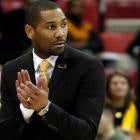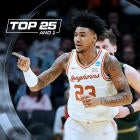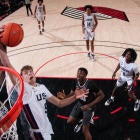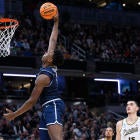The search to replace Chris Holtmann at Butler took 72 hours, if that. Thirty-eight-year-old LaVall Jordan -- a Butler alum and former Bulldogs assistant, and most recently coach at Milwaukee -- will try to keep this program nationally competitive.
It will not be easy, and Butler is one of the most interesting jobs in any Major 7 (ACC, AAC, Big 12, Big East Big Ten, Pac-12, SEC) league. The Bulldogs have made 14 NCAA Tournaments in past 21 years and are a perennial Big East contender, but 10 of those 14 Big Dance trips came while they were in the Horizon League. The past four came with Brad Stevens and Holtmann as coach, one of those during a stopover season in the Atlantic 10 -- just before Stevens left to coach the Celtics.
Butler is established, but also a program with good-but-not-great facilities, entry-requirement barriers for some recruits and playing in a Big East set up to be a top-five conference. With that in mind, remember that Butler went from the Horizon League to the Atlantic 10 to the Big East in three seasons. At the time of Butler's move to the A-10, and then when the Big East had an opening amid conference realignment, the notion was Butler could tread water in major-conference tides, thanks to Stevens.
Then Stevens left, and plenty wondered if Butler would lag. Butler could have taken a negative turn. In a contemporary view, Butler in the past decade has become a top-40 job and top-30 program in college basketball. Yet if Holtmann had not been able to run the program at a high level, Butler might well be Big East basement mates with DePaul. It wouldn't be viewed as the same program it is now. That's how much Holtmann did in only three seasons. He also won four NCAA Tournament games, had a 70-31 record and just landed the highest-rated recruiting class in school history.
Holtmann came in after after Butler went 14-17 in one season under Brandon Miller (who reportedly got the job over runner-up choice Jordan back in 2013). Miller quit college basketball altogether shortly before the start of the 2014-15 season and Holtmann stabilized the program in the Big East. I don't think a lot of coaches could have done what he did in the same spot.
Jordan comes in with the benefit of good players but faces a future without those who built the foundation. Butler has a roster that's top-25 good heading into next season, thanks to Holtmann and assistants Terry Johnson, Ryan Pedon and Mike Schrage. Those assistants were passed over for the job -- the first time since 1989 that a sitting Butler assistant wasn't promoted to the top post -- and are joining Holtmann at Ohio State, so Jordan has to build a staff that can keep up with Villanova, Xavier, Creighton and Providence.
Jordan took the Milwaukee job last season and went 11-24 after retaining only four scholarship players. There will be no such situation at Butler. And Jordan's experience in the NCAAs should help him on the recruiting trail. He was on the Michigan staff that made the 2013 national championship game, and helped recruit and/or develop Trey Burke, Nik Stauskas, Mitch McGary and Caris LeVert -- all first-round NBA Draft picks.
"LaVall is a tremendous coach who exemplifies the Butler way," Butler athletic director Barry Collier said. "He has played a major role in successful programs that have competed at the highest levels. LaVall also has a deep appreciation for our university and this program, and will recruit and develop young men who will represent Butler well."
The "Butler way" motto has impact at Hinkle FieldHouse. There's a reason Butler had hired coaches off the program tree. It worked. Now, Jordan takes over with Butler in a position it never before has seen: In a power league with a new coach holding a talented roster and in the midst of its best two-year recruiting run.
Jordan has the pedigree. When he graduated in 2001, he was the winningest player in program history (91 victories) -- and while the landscape surrounding Butler is a lot different than 16 years ago, those in the Butler family are confident in what they're getting. One source close to Butler said, "He's got a great presence and a calm demeanor. Smart and connects well with people. He's a Butler guy through and through."
To the rest of college basketball, Jordan's mostly an unknown. His hire could be a barometer for how the program keeps up in the aggressive Big East. Butler's program has been built to the point where it's stronger than any coach, and the best sign of a program's strength is how it lifts up the coaches it inherits. Even if Jordan doesn't pan out long term, Butler figures to still be a B-level job a worst.
And if Jordan continues in the model of Stevens and Holtmann, Butler's legitimacy as a top-30 program will be validated.






















